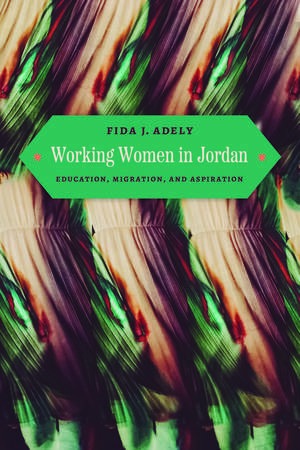Working Women in Jordan: Education, Migration, and Aspiration
Autor Fida J. Adelyen Limba Engleză Paperback – 5 iun 2024
Jordan has witnessed tremendous societal transformation in its relatively short history. Today it has one of the most highly educated populations in the region, and women have outnumbered and outperformed their male counterparts for more than a decade. Yet, despite their education and professional status, many women still struggle to build a secure future and a life befitting of their aspirations.
In Working Women in Jordan anthropologist Fida J. Adely turns to college-educated women in Jordan who migrate from rural provinces to Amman for employment opportunities. Building on twelve years of ethnographic research and extensive interviews with dozens of women, as well as some of their family members, Adely analyzes the effects of developments such as expanded educational opportunities, urbanization, privatization, and the restructuring of the labor market on women’s life trajectories, gender roles, the institution of marriage, and kinship relations. Through these rich narrative accounts and the analysis of broader socio-economic shifts, Adely explains how educational structures can act as both facilitators and obstacles to workforce entry—along with cascading consequences for family and social life. Deeply thorough and compelling, Working Women in Jordan asks readers to think more critically about what counts as development, and for whom.
| Toate formatele și edițiile | Preț | Express |
|---|---|---|
| Paperback (1) | 184.22 lei 3-5 săpt. | +12.23 lei 6-12 zile |
| University of Chicago Press – 5 iun 2024 | 184.22 lei 3-5 săpt. | +12.23 lei 6-12 zile |
| Hardback (1) | 670.48 lei 6-8 săpt. | |
| University of Chicago Press – 5 iun 2024 | 670.48 lei 6-8 săpt. |
Preț: 184.22 lei
Nou
Puncte Express: 276
Preț estimativ în valută:
35.25€ • 38.45$ • 29.72£
35.25€ • 38.45$ • 29.72£
Carte disponibilă
Livrare economică 03-17 aprilie
Livrare express 19-25 martie pentru 22.22 lei
Preluare comenzi: 021 569.72.76
Specificații
ISBN-13: 9780226833941
ISBN-10: 0226833941
Pagini: 224
Ilustrații: 1 halftones
Dimensiuni: 152 x 229 x 18 mm
Greutate: 0.32 kg
Ediția:First Edition
Editura: University of Chicago Press
Colecția University of Chicago Press
ISBN-10: 0226833941
Pagini: 224
Ilustrații: 1 halftones
Dimensiuni: 152 x 229 x 18 mm
Greutate: 0.32 kg
Ediția:First Edition
Editura: University of Chicago Press
Colecția University of Chicago Press
Notă biografică
Fida J. Adely is the Hala and Clovis Maksoud Chair in Arab Studies and associate professor at the Center for Contemporary Arab Studies, Georgetown University. She is the author of Gendered Paradoxes: Educating Jordanian Women in Nation, Faith, and Progress, published by the University of Chicago Press.
Cuprins
Introduction
Interlude One—Elias and Hoda
1 A History of Education, Labor, and Migration
Interlude Two—Buthayna
2 Migration, Agency, and Aspiration
Interlude Three—Rania
3 Making a Life in Amman
Interlude Four—Um Wijdan, Hannan, and Hala
4 Family, Power, and Change
Interlude Five—Sameera
5 Marriage, Staying Single, and Making a Home
Conclusion
Acknowledgments
Notes
Bibliography
Index
Interlude One—Elias and Hoda
1 A History of Education, Labor, and Migration
Interlude Two—Buthayna
2 Migration, Agency, and Aspiration
Interlude Three—Rania
3 Making a Life in Amman
Interlude Four—Um Wijdan, Hannan, and Hala
4 Family, Power, and Change
Interlude Five—Sameera
5 Marriage, Staying Single, and Making a Home
Conclusion
Acknowledgments
Notes
Bibliography
Index
Recenzii
In vibrant ethnographic detail, Working Women in Jordan illuminates the desires, aspirations, and struggles of young, educated women who have migrated to Amman to work. Adely brilliantly uplifts women’s 'creative agency' while contextualizing their lives in relation to Jordan’s neoliberal economic policies and demographic shifts, as well as the growing urbanization and density of its capital city. The longitudinal perspective Adely brings to women’s work and family experiences is invaluable for our understandings of gendered social change."
